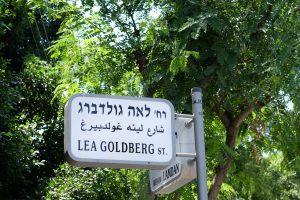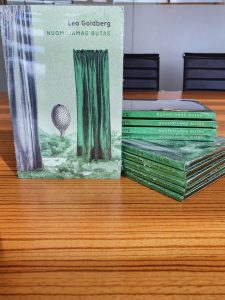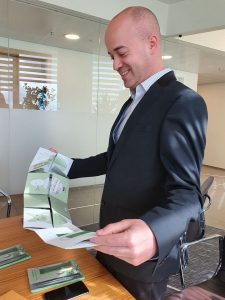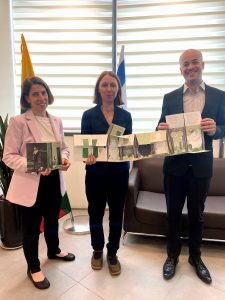Leah Goldberg
Leah Goldberg or Lea Goldberg (Hebrew: לאה גולדברג; May 29, 1911, Königsberg – January 15, 1970, Jerusalem) was a prolific Hebrew-language poet, author, playwright, literary translator, and comparative literary researcher.
Her writings are considered classics of Israeli literature.
Leah Goldberg was born to a Jewish Lithuanian family from Kaunas, however her mother traveled to the nearby German city of Königsberg (today, Russian Kaliningrad) in order to give birth in better medical conditions. When asked about her place of birth, Goldberg often stated "Kaunas" rather than Königsberg.
When the First World War broke out, three-year-old Goldberg had to escape with her parents to the Russian Empire, where they spent a year in hard conditions. In Russia, her mother gave birth to a baby boy, Immanuel, who died before reaching his first birthday.
According to Goldberg's autobiographical account, in 1938, when the family traveled back to Kaunas in 1919, a Lithuanian border patrol stopped them and accused her father of being a "Bolshevik spy". They locked the father in a nearby abandoned stable, and abused him by preparing his execution every morning for about a week and cancelling it at the last moment. When the border guards finally let the family go, Goldberg's father was in a serious mental state. He eventually lost his ability to function normally and left Kaunas and his family to receive treatment, though it is unclear what his fate was and why he never returned to his family. Goldberg and her mother became very close and lived together until Leah Goldberg's death.
Goldberg's parents spoke several languages, though Hebrew was not one of them. However, Goldberg learned Hebrew at a very young age, as she received her elementary education in a Jewish Hebrew-language school. She began keeping a diary in Hebrew when she was 10 years old. Her first diaries still show limited fluency in Hebrew and the influence of Russian language, but she was determined to write in Hebrew and mastered the language within a short period of time. Even though she was fluent and literate in various European languages, Goldberg wrote her published works, as well as her personal notes, only in Hebrew. In 1926, when she was 15 years old, she wrote in her personal diary, "The unfavourable condition of the Hebrew writer is no secret to me [...] Writing in a different language than Hebrew is the same to me as not writing at all. And yet I want to be a writer [...] This is my only objective."
Goldberg received a PhD from the Universities of Berlin and Bonn in Semitic languages and German. Her erudition and renown was such that a leading newspaper in Palestine excitedly reported her plans to immigrate to that country. In 1935, she settled in Tel Aviv, where she joined a group of Zionist Hebrew poets of Eastern-European origin known as Yachdav (Hebrew: יחדיו "together"). This group was led by Avraham Shlonsky and was characterised by adhering to Symbolism especially in its Russian Acmeist form, and rejecting the style of Hebrew poetry that was common among the older generation, particularly that of Haim Nachman Bialik.
She never married and lived with her mother, first in Tel Aviv and later in Jerusalem. Goldberg was a heavy smoker, and in her late years she became aware of the damage in this habit, as reflected in her poem "About the Damage of Smoking". In the spring of 1969, she was diagnosed with breast cancer. After removing one of her breasts, her physicians were optimistic. Goldberg went on a short visit to Switzerland, but returned in a bad physical condition, as the cancer spread through her body. She died on 15 January 1970.Goldberg received the Israel Prize posthumously, her mother took the prize in her name.
Goldberg worked as a high-school teacher and earned a living writing rhymed advertisements until she was hired as an editor by the Hebrew newspapers Davar and Al HaMishmar. She also worked as a children’s book editor at Sifriyat Po'alim publishing house, while also writing theatre reviews and literary columns. In 1954 she became a literature lecturer at the Hebrew University of Jerusalem, advancing to senior lecturer in 1957 and full professor in 1963, when she was appointed head of the university's Department of Comparative Literature.
Goldberg wrote Hebrew poetry, drama, and children's literature. Goldberg's books for children, among them "A Flat for Rent" ("דירה להשכיר", dira lehaskir) and "Miracles and Wonders" (ניסים ונפלאות, nisim veniflaot), have become classics of Hebrew-language children's literature.
With exemplary knowledge of seven languages, Goldberg also translated numerous foreign literary works exclusively into Modern Hebrew from Russian, Lithuanian, German, Italian, French, and English. Of particular note is her magnum opus of translation, Tolstoy's epic novel War and Peace, as well as translations of Rilke, Thomas Mann, Chekhov, Akhmatova, Shakespeare, and Petrarch, plus many other works including reference books and works for children.
From: Wikipedia
 The March of the Living 2010 / by Leah Kessel
The March of the Living 2010 / by Leah Kessel
When we were growing up in Ramatayim, our neighbors were a family who had come from Kovno in Lithuania. The fact that we were all "Lithuanians" was a common bond and we became more than just family. Rachel Shapira, the mother, brought the Kovno culture to Ramatayim. She would drag all the children to the theater and to concerts in Tel Aviv by bus regardless of the rain or the heat. Some of the most famous actors of the time such as Shmuel Rodensky and Klatchkin were very close friends of hers. Of course, we all had to learn to play the pia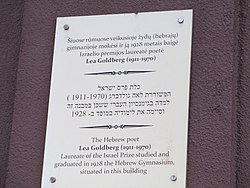 no!!
no!!
Rachel Shapira was a friend and classmate of Leah Goldberg at the Schwebbe high school in Kovno. They remained friendly even after they both came to Israel in 1935.
At the beginning of the 90's, after Lithuania had become an independent state, the Lithuanian Ministry of Culture invited Rachel Shapira's two sons, Professor Amos Shapira and Mulli Shapira (who was in charge of the Israeli army radio station's cultural program for many years), to visit Kovno. When they returned from the visit they told us of their experiences but were very angry that there was no memorial or memorial plaque at all to Leah Goldberg in Kovno.
My sister took the initiative and, together with Asta Skaisgirytė Liauškienė , who was then the Lithuanian ambassador to Israel, they broached the subject to Kovno City Hall. However, the Kovno municipality refused to hang a plaque claiming that Leah Goldberg had not been born in Kovno. Asta suggested using a lobby of some sort against the municipality. My sister, who was a member of a voluntary women's organization called "Soroptimists", discovered that there was also a branch of the organization in Kovno. With the help of that group, permission was granted to hang a plaque on the wall of the high school in Kovno. The ambassador then suggested that the plaque be unveiled when the Association of Jews from Vilna and the vicinity participates in its traditional March of the Living. And so it was.
My sister and I joined the group of the March of the Living in 2010. We went to Kovno to make the last-minute arrangements and, on the 11/4/2010 the group of the March of the Living came to the high school in Kovno. Members of the Jewish community in Kovno came to the ceremony and the mayor also turned up at the last minute.
The Kovno Soroptimists brought a pine tree which they planted during the ceremony. They got the idea from one of Leah Goldberg's poems which expressed her feelings about her life between two motherlands:
Twice I was planted with you
And with you, pines, I grew
In two different places I dropped roots
At the end of the ceremony we joined the March of the Living group for the rest of the trip around Vilna.
Sometime later the Lithuanian ambassador, Darius Degutis asked my sister why she had worked so hard to get a plaque for Leah Goldberg. She responded: "I did it to honor the memory of Rachel Shapira."
In September 2022, 'Apartment for rent', the immortal story of Leah Goldberg, written in the last half of the last century, has been translated into Lithuanian and performed in Vilnius in an innovative and refreshing design. An important book on the bookshelf in every home


